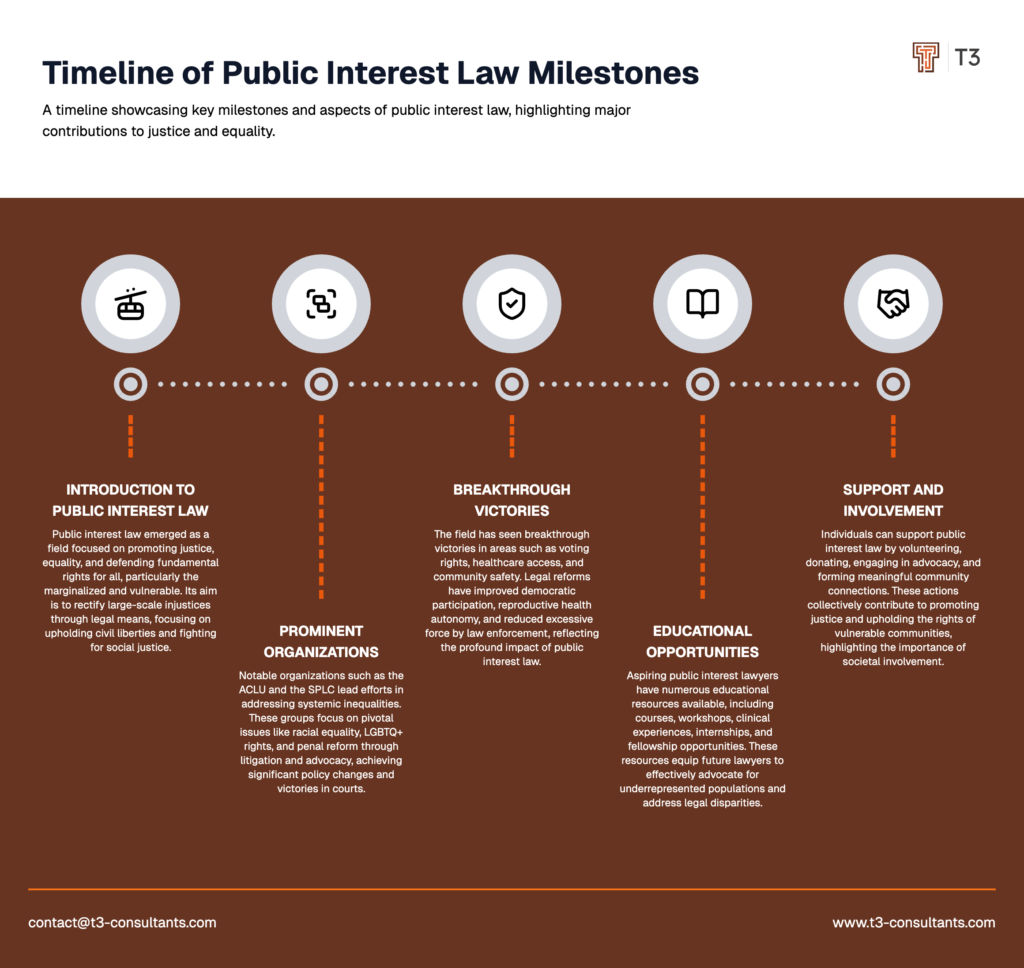
What Is Public Interest Law? Key Organizations & Resources
Introduction to Public Interest Law: Championing Justice and Fundamental Rights
Public interest law is a specialized field that seeks to promote justice, equality, and the defense of fundamental rights for all members of society. It especially seeks to defend the more marginalized and vulnerable members of society. Public interest law in its most vital purpose seeks to rectify large-scale injustices and have legal systems that serve the purposes of the public rather than a specific person, element, or corporation. A major role of public interest law is to protect civil liberties, fight for social justice, and bring institutions to account.
The main purpose that unites public interest law as a subject of study and a career option is the pursuit of justice. Through plugging large-scale inequalities and often acting as a voice for disempowered or underrepresented people in the halls of power, public interest law is a powerful tool to pursue justice and promote change. Nearly every area related to public interest law, such as human rights law, civil liberties, and advocacy for the less fortunate. This aspect of law is especially vital for society as many people rely on public interest lawyers to have access to the legal system.
At its very core, public interest law is designed to ensure that the freedoms and fundamental rights that have been enshrined in domestic and international laws are recognized and protected equally. Through public interest litigation and reform, public interest lawyers fight injustices and maintain the spirit of the law. For the vulnerable, the marginalized, and the poor, public interest lawyers shield, advocate, and represent the most defenseless among us.
Prominent Public Interest Law Organizations
Public interest law is a crucial field devoted to combating systemic inequalities and promoting justice for oppressed populations. In this essential sector, many organizations utilize their expertise to make a difference, working with their values to enact positive change. Some of the most crucial organizations in public interest law are highlighted below, alongside descriptions of their projects and how they have made a difference in their communities.
- American Civil Liberties Union (ACLU)
The ACLU is among the most well-known public interest law organizations, with a vision to protect and safeguard individual rights and freedoms given in the Constitution. The ACLU is fighting systemic injustices through litigation, advocacy, and public education, focusing on racial equality, LGBTQ+ rights, and penal reform. The organization has secured major victories in court and advancements in policy to safeguard oppressed communities. - Southern Poverty Law Center (SPLC)
The SPLC battles bigotry, bigotry, and inequality through legal and educational means. Their goal is to dismantle systemic disparities through advocacy for the rights of vulnerable groups, including immigrants, people of color, and low-income individuals. The SPLC’s projects have contributed to important successes against hate organizations and biased efforts, resulting in more cohesive and inclusive surroundings. - Legal Aid Society
The Legal Aid Society, one of the oldest and biggest legal aid organizations, offers free legal assistance to low-income persons and families. Their goal is to ensure that everyone has equal access to justice by addressing systemic disparities in housing, employment, and family law. By delivering direct assistance to communities, the Legal Aid Society aids individuals in navigating complex legal structures and safeguarding their rights. - NAACP Legal Defense and Educational Fund (LDF)
The LDF is at the forefront of the fight for racial justice and fairness. Their aim is to achieve structural reform through litigation, advocacy, and public education. The LDF has been a key actor in landmark cases on voting rights, education equality, and penal reform, making a significant impact on systemic inequities and empowering dependent populations.
These organizations are examples of how impactful public interest law can be in combating systemic disparities and providing critical assistance to communities. Through their goals and programs, they continue to innovate and campaign for a more just and fair society.
Breakthrough Victories and Progress: Advancing Rights and Access
In the sphere of public interest law, breakthrough victories have had profound effects on the landscape of rights and access, generating a chain reaction of progress across essential aspects, including voting, healthcare, and safety. These legal victories not only served to remedy systemic injustices but also emboldened entire communities and enabled them to both demand and secure their inherent rights.
Among the most reformed and improved areas is that of voting rights. Legal successes thoroughly obliterated any discriminatory rulings, such as those revolving around voter ID regulations and gerrymandering; following these breakthroughs, access to ballots became increasingly fair and just. For instance, recent court decisions expanded those eligible to vote early and re-granted voting rights to former felons across various states. These legal reforms have increased democratic participation and facilitated the representation of marginalized groups.
Progress in healthcare, on the other hand, has been heavily accentuated by public interest litigation. Legal proceedings have taken on policies that restricted the populace’s access to reproductive healthcare, ensuring that citizens could ultimately make informed decisions about their wellness. Furthermore, several lawsuits consequently compelled governmental bodies to systematically supply Medicaid and further necessary health services for public access, extensively improving low-income families’ quality of access to such care. Such specific victories have saved lives and set precedents for the further development of crucial healthcare measures.
Safety has similarly benefited immensely from public interest law, with new legal reforms substantially tougher on workplace safety regulations. Consequentially, the hazard aspect of workers engaging in high-risk occupations has notably decreased. Furthermore, lawsuits aimed at police departments have forced reformation and reconsideration of extensively reducing excessive force and enhancing said organizations’ accountability. These legal undertakings have collectively made communities a more profoundly safe and fair place.
The progress spurred by the breakthrough victories offers significant insight into public interest law’s potential to instigate substantial change. By breaking down systematic obstacles and advocating fervently for the principles of justice, the outcomes of these legal breakthroughs contributed to broadened access throughout essential areas, further guaranteeing required rights while simultaneously ushering in an era of equitable comprehensive society. In commemorating these achievements, it is unequivocally apparent that the fight for justice and equality remains a perpetuating one, however, the accumulation of every victory remarkably draws us each time closer for a fair future.

Educational Resources and Opportunities for Aspiring Public Interest Lawyers
When pursuing a career in public interest law, educational resources and opportunities are essential to assist you in growing professionally while simultaneously making a positive impact. Such programs and initiatives are geared towards expanding your knowledge, skills, and access to the realm of law, thereby contributing to the promotion of justice within underprivileged communities.
As a prospective public interest lawyer, you can explore a variety of educational programs provided by law schools, nonprofit organizations, and legal entities. These institutions often offer courses, workshops, and clinics that center on particular aspects of law, such as civil rights, immigration issues, and environmental justice, enabling you to delve deeper into critical legal topics. Moreover, these programs equip you with the tools necessary to advocate for marginalized individuals more effectively.
In addition to formal education, opportunities for practical experience are abundant. For example, internships and fellowships with public interest groups, governmental organizations, and nonprofit associations allow you to engage in real-world cases and contribute to systemic solutions. While programs like the Equal Justice Works Fellowship and the Skadden Fellowship are highly competitive, they represent a unique opportunity to begin your public service career.
Another vital source of experience is pro bono work, which involves taking on cases in which the attorney does not charge a fee. Notably, many law firms and bar associations encourage pro bono work, giving practitioners the opportunity to address urgent legal concerns while aiding the community. This approach not only improves your resume but also demonstrates your commitment to the concepts of justice and fairness.
Through the use of these resources and opportunities, aspiring public interest lawyers can broaden their reach and help address disparities in access to legal representation. Opportunities such as educational programs, internships, and pro bono efforts enable both development and service, allowing you to actively effect positive changes while furthering your career in public interest law.
How to Get Involved and Support Public Interest Law
Public interest law is pivotal in upholding the rights of marginalized communities and ensuring justice and equality for all individuals. If you are dedicated to promoting fairness and inclusivity within society, there are multiple ways you can actively contribute to and support this important legal domain. Consider the following actionable insights to make a meaningful impact:
- Lend Your Time and Expertise Voluntarily: Many public interest law entities heavily rely on volunteers to assist with various tasks including research, outreach, and public education. Regardless of your professional background, if you are a supportive citizen, your contribution is invaluable in preserving the rights of underserved populations. Begin by exploring local legal clinics and non-profit organizations dedicated to causes aligned with your values.
- Make Donations to Help Sustain the Movement: Financial support is indispensable for public interest law firms to sustain their critical undertakings. Your donations help fund imperative legal cases aimed at promoting justice and safeguarding disadvantaged communities. Even modest contributions are impactful, so consider setting up regular donations to provide sustained support to the cause.
- Be an Agent for Change and Advocacy: Utilize your platform to raise awareness about issues that signify social significance. Voice your concerns by engaging with your local representatives, signing meaningful petitions, or involving yourself in advocacy drives focused on bringing about holistic transformations. Advocacy forms the cornerstone of progress within public interest law that seeks to safeguard the rights of all citizens.
- Cultivate Meaningful Community Connections and Allyship: Public interest law fundamentally thrives on community connections and supportive alliances. Collaborate with local organizations, participate in relevant events, and actively engage in discussions centering justice and equality. By developing supportive connections and alliances, you contribute to the creation of a sustainable network of advocates focused on safeguarding rights and promoting fairness.
Supporting public interest law transcends individual actions and is vested in societal inclusivity and collective action. Whether you explore voluntarism, make donations, engage in advocacy, or promote responsive community connections, your efforts cumulatively contribute to promoting fairness and upholding the rights of vulnerable individuals. Join the advocacy movement today and become an active agent of transformation!
Conclusion
Public interest law makes an indispensable benefit for promoting justice and developing fair and just societies. It is responsible for virtually addressing systemic prejudiced patterns and standing up for marginalized people to underscore that the legal system is designed to be made for good. Achievements that were attained with public interest law were globe-changing in their character, but there is more hard work to be done. Fresh, ongoing, and substantial assistance must always be maintained to ensure its progress and improvement to make everybody have an opportunity to acquire good protection and justice.
As parts of its societies, everyone plays a part in the implementation of Public Interest Law. It is important to perform such things as offering them a hand or donating money, or even just disseminating public interest law understanding. Premium groups allow public interest standards to be met, and everyone must remain conscious of what they are responsible for. Helpful instructions are accessible for individuals to generate input of their own. In conjunction with it, we can make a sound contribution to the evolved justice and comprehensive civilization. Take action now, engage with your colleagues, as community justice is progressing because we are united.
